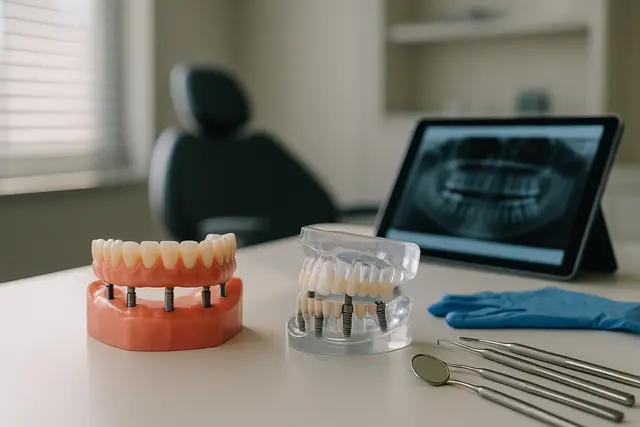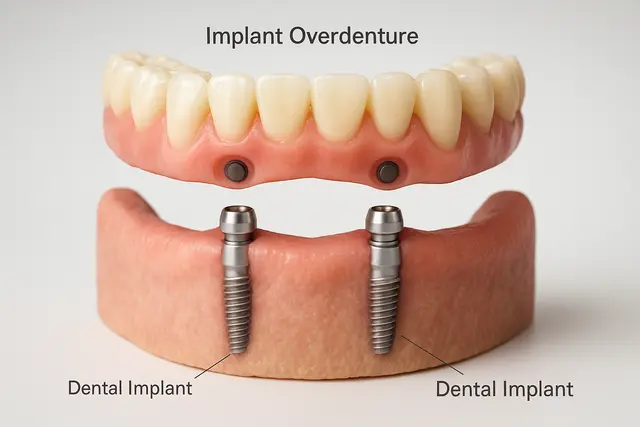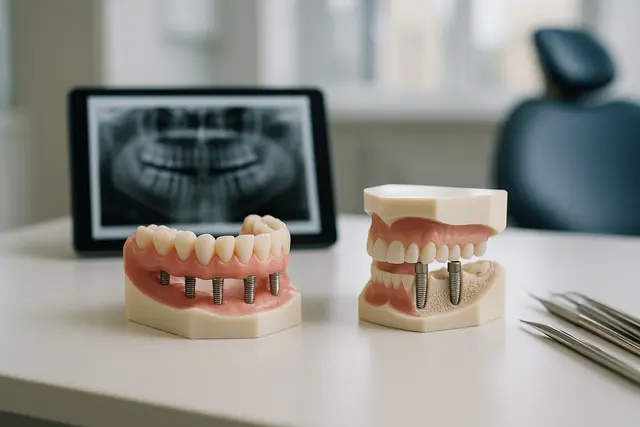Prosthodontics
5 min read
Sep 10, 2025
Does Dental Insurance Cover Partial Dentures? What’s Typically Included
Losing teeth can be a life-altering experience, affecting everything from how you eat to how you smile. For many, dentures, especially partial ones, offer an effective solution to restore both function and confidence. But figuring out how dental insurance fits into the picture can be confusing.

Tooth loss is no walk in the park. Whether it’s one tooth or several, the impact on your smile, confidence, and everyday life is real. That’s where dentures come in. Specifically, partial dentures can work wonders for replacing missing teeth while keeping your natural ones intact. But if your next question is, “Does dental insurance cover partial dentures?” you're definitely not alone.
We’re about to break this down in a way that’s easy to understand and maybe even a little fun, because dental care shouldn’t feel like decoding ancient hieroglyphics.
Understanding How Dental Insurance Handles Dentures
First things first: most dental insurance plans do offer some coverage for dentures, including full dentures and partial dentures, but how much they cover, when they cover it, and which services are included can vary more than your aunt’s lasagna recipe.
Some dental insurance plans offer coverage for major services like dentures, especially if you're replacing missing teeth due to injury, decay, or other dental procedures. But before you get too excited, there’s a catch (there’s always a catch): the waiting period.
The Waiting Period Can Test Your Patience
A common clause in a dental insurance plan is the insurance waiting period. This is the time you have to wait after enrolling before your benefits kick in for bigger ticket items like a denture, crown, or implant.
For dentures, this waiting period typically ranges from six months to a year. It's a way for the insurance company to avoid people signing up only when they need major work and ditching the plan after. Annoying? A bit. Understandable? Definitely.
If you're looking for dental insurance that covers dentures sooner, check if the plan offers coverage for dentures right away or includes discount dental plans or group dental options. Plans vary, and so do their fine print.
Denture Costs Can Sneak Up on You
Let’s talk numbers, because that’s what usually makes people sweat.
So, how much do dentures cost? The average cost of a partial denture can range anywhere from $500 to $2,500 per arch, depending on the type of partial and materials used. Full dentures cost more, up to $5,000 for upper and lower sets.
Here’s where it gets tricky. Denture costs aren't just about the teeth. Add in dental procedures like extractions, fittings, adjustments, and you could be looking at some serious out-of-pocket costs if you’re without dental insurance.
Even individual dental insurance usually only covers dentures up to a percentage, say 50%, and often comes with coverage limits and annual coverage caps.
What’s Typically Included in Denture Coverage
If your dental insurance benefits include denture coverage, here’s what might be included:
Consultations and X-rays to assess the need
Tooth extractions (sometimes)
Fittings and impressions for your partial or complete dentures
The denture appliance itself (yay!)
Adjustments after the fitting
Repairs (depending on the plan)
Coverage may vary based on whether it’s a traditional denture, flexible partial denture, or immediate dentures. And yes, immediate dentures, those made and fitted right after extraction, can cost a bit more due to extra appointments and materials.
Partial Denture Options and Insurance Coverage
Let’s zoom in on the partial denture. These are great if you’re only missing a few teeth and still have natural teeth that are strong and healthy. A partial is removable, custom-fitted, and often less expensive than implants or bridges.
There are several types of dental partials:
Acrylic partial dentures: Lightweight, lower cost, but not the most durable
Flexible partial dentures: Made with soft material that bends with your mouth, great comfort, decent price
Cast metal partials: More durable and natural-looking, but higher on the denture costs spectrum
Your dental insurance plan might cover each differently. Some insurance companies prefer the more traditional acrylic or metal types over newer, more flexible materials. Again, the fine print reigns supreme.
What About Implants? Spoiler: They’re Not Cheap
If you’re dreaming about dental implants, we love the ambition. They’re strong, permanent, and feel just like your real teeth. But they’re also not usually covered in full by dental insurance.
Dental implants often fall outside what’s considered major services unless the plan is super generous. Some plans might help cover the cost partially, while others treat it like a cosmetic procedure. And let’s be real, dental implants can cost thousands per tooth.
Still, implants are a long-term investment, and if you have a partial that keeps breaking or slipping, it might be worth asking your dentist about hybrid options.
Dental Plans That Help Cover the Cost of Dentures
So, which kind of dental plan is right if you need dentures?
Traditional dental insurance: Typically includes dental insurance coverage for restorative dental procedures like dentures and crowns, but with a waiting period and coverage limits
Discount dental plans: These are not technically insurance. But they can give you reduced rates on services, especially without insurance. Many are available in all states and cover dental and vision plans
Group dental plans: Offered by employers, they sometimes provide more robust insurance benefits and lower out-of-pocket costs
Not all plans are created equal, and not all services are covered, so it’s worth having a chat with an insurance agent or reviewing the plan’s summary carefully.
Dentures Are Removable, but the Costs Might Stick Around
Yes, dentures are removable, but the price tag isn’t going anywhere. If you’re on a budget or facing tooth loss for the first time, the costs can feel like a surprise party you didn’t want.
And while traditional dentures and conventional dentures are more affordable than implants, they still involve materials, time, and multiple appointments. That’s why insurance coverage matters more than ever.
Whether it’s an acrylic base, metal framework, or the type of clasp used to hook around your natural teeth, each element can impact the cost.
A Denture May Be the First Step Toward Better Oral Health
Getting a denture isn’t just about filling a gap in your smile. It’s about restoring function, confidence, and your overall oral health.
If you’ve been putting it off due to the cost of dentures, know that there are ways to manage expenses and get the care you need. A quality dental insurance plan can really help cover the cost of dentures, lower your out-of-pocket responsibility, and keep your dental future looking bright.
Does Dental Insurance Usually Cover Partial Dentures?
Yes, most dental insurance plans provide at least partial coverage for dentures, including partial dentures. However, the amount and conditions vary. Many policies classify dentures as a major dental service and may cover around 50% of the cost after you meet your deductible. Be aware that annual maximum benefits can cap how much your plan pays, and some insurers only cover dentures once every several years. Always review the plan’s details carefully to avoid unexpected costs.
What Extra Costs Should I Expect Beyond the Denture Itself?
Denture costs go far beyond the denture appliance. You may need diagnostic exams, X-rays, impressions, or tooth extractions before your dentures can be placed. There are also fitting and adjustment appointments to ensure comfort. If you’re getting immediate dentures, those usually come with additional costs because they involve more appointments and lab work. These added services can significantly impact your out-of-pocket expenses, especially if your insurance plan does not cover everything.
Are Flexible or Metal Partials Covered Differently by Insurance?
Coverage can differ depending on the type of partial denture you choose. Traditional acrylic and cast metal partials are more commonly included in insurance coverage because they have been around longer and are considered standard care. Flexible partials, while more comfortable and natural-looking, may not always be covered fully by every plan. Some insurers treat them as an upgrade and will only pay the equivalent of a standard denture, leaving you to cover the difference.
What Options Do I Have If I Don’t Have Dental Insurance?
If you don’t have dental insurance, dentures can still be affordable with the right approach. Dental schools often provide lower-cost treatment performed by supervised students, and community health centers may offer sliding scale fees. Many dental offices also provide in-house financing or payment plans to spread out costs. Another option is a dental discount plan, which isn’t insurance but can reduce fees significantly. Exploring these alternatives can make dentures more accessible even without traditional coverage.
Read Next
Related Posts

Prosthodontics
Implant Supported Dentures Overview
Missing teeth can impact more than just your smile, they can affect your confidence, comfort, and even your diet. Fortunately, modern dentistry offers a solution that’s both secure and natural-looking: implant-supported dentures. This innovative approach blends the stability of implants with the convenience of dentures to create a long-lasting, life-improving upgrade.
5 min read
Oct 29, 2025

Prosthodontics
Implant Overdentures Explained: The Hybrid Solution to Missing Teeth
Missing teeth can impact everything from your ability to eat to your self-confidence. While traditional dentures have long been a go-to solution, they often fall short in comfort and stability. Implant overdentures offer a modern alternative that combines the security of dental implants with the convenience of removable dentures, a true upgrade for those looking to reclaim their smile.
6 min read
Oct 29, 2025

Prosthodontics
Implant Retained Dentures Explained
Considering implant-retained dentures? You're not alone. As modern dentistry evolves, more people are turning to this secure, natural-feeling alternative to traditional dentures. This guide will walk you through what they are, how they work, and why they might be the solution you've been looking for.
4 min read
Oct 28, 2025
Don’t have time to research every dentist around you?
See why 30k+ patients trusted us